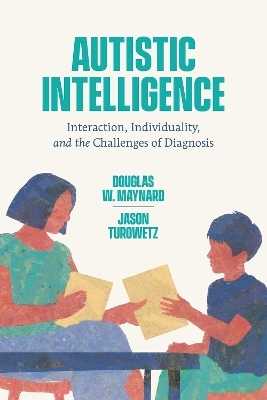
Autistic Intelligence
University of Chicago Press (Verlag)
978-0-226-81600-5 (ISBN)
As autism has grown in prevalence, so too have our attempts to make sense of it. From placing unfounded blame on vaccines to seeking a genetic cause, Americans have struggled to understand what autism is and where it comes from. Amidst these efforts, however, a key aspect of autism has been largely overlooked: the diagnostic process itself. That process is the central focus of Autistic Intelligence. The authors ask us to question the norms by which we measure autistic behavior, to probe how that behavior can be considered sensible rather than disordered, and to explore how we can better appreciate the individuality of those who receive the diagnosis.
Drawing on hundreds of hours of video recordings and ethnographic observations at a clinic where professionals evaluated children for autism, the authors’ analysis of interactions among clinicians, parents, and children demystifies the categories, tools, and practices involved in the diagnostic process. Autistic Intelligence shows that autism is not a stable category; it is the outcome of complex interactional processes involving professionals, children, families, and facets of the social and clinical environments they inhabit. The authors suggest that diagnosis, in addition to carefully classifying children, also can highlight or include unique and particular contributions those with autism potentially can make to the world around us.
Douglas W. Maynard is the Maureen T. Hallinan Professor of Sociology, emeritus at the University of Wisconsin–Madison. He is author or editor of numerous books, including Bad News, Good News: Conversational Order in Everyday Talk and Clinical Settings, also published by the University of Chicago Press. Jason Turowetz is postdoctoral research fellow at the the University of Siegen's Center for Media of Cooperation with an appointment at the Garfinkel archive in Newburyport, MA. He is the author of over thirty academic articles and co-author of Morality in the Making: Stanley Milgram’s ‘Obedience’ Experiments and the New Science of Morality (forthcoming from Oxford University Press).
Chapter 1: Common Sense and the Interaction Order of the Clinic
Chapter 2: A Brief History and Biology of Autism Diagnosis: Why We Need an Interactional Approach
Chapter 3: An Interactional Entrance to Autism Diagnosis
Chapter 4: Autistic Intelligence as Uncommon Sense
Chapter 5: Varieties of Autistic Intelligence
Chapter 6: Doing Diagnosis: Narrative Structure
Chapter 7: Is Autism Real?
Chapter 8: Interaction and the Particular Autistic Person
Acknowledgments
Notes
References
Index
| Erscheinungsdatum | 20.04.2022 |
|---|---|
| Zusatzinfo | 22 halftones, 1 line drawings, 1 tables |
| Sprache | englisch |
| Maße | 152 x 229 mm |
| Gewicht | 313 g |
| Themenwelt | Sachbuch/Ratgeber ► Gesundheit / Leben / Psychologie |
| Geisteswissenschaften ► Psychologie ► Klinische Psychologie | |
| Medizin / Pharmazie ► Medizinische Fachgebiete ► Neurologie | |
| Studium ► 2. Studienabschnitt (Klinik) ► Anamnese / Körperliche Untersuchung | |
| ISBN-10 | 0-226-81600-1 / 0226816001 |
| ISBN-13 | 978-0-226-81600-5 / 9780226816005 |
| Zustand | Neuware |
| Informationen gemäß Produktsicherheitsverordnung (GPSR) | |
| Haben Sie eine Frage zum Produkt? |
aus dem Bereich


